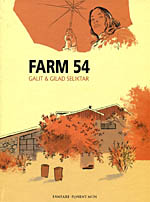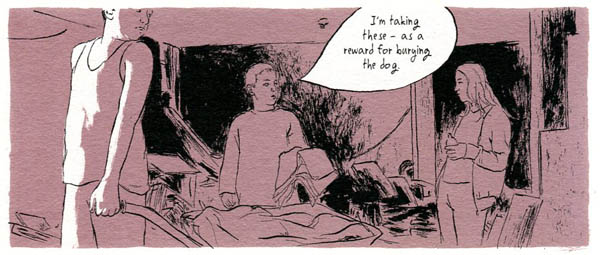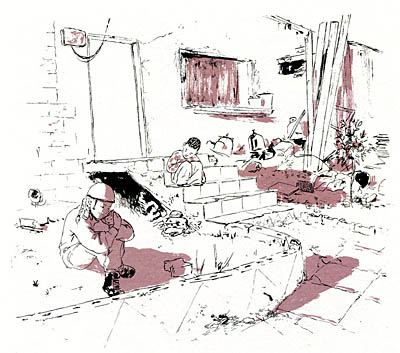 Written by Galit Seliktar
Written by Galit Seliktar
Art by Gilad Seliktar
128 pages, two-color
Published by Fanfare/Ponent Mon
Farm 54 is one of those books that quietly straddles multiple categorizations, almost silently defying you to try and place it somewhere. It’s autobiographical, but also fiction. It’s a graphic novel, but it’s based off of three prose short stories. Even the fact that it’s two-color instead of full color or black and white will no doubt perplex some readers. But if you’re willing to cross the boundaries to examine Farm 54, you end up with a curiously enjoyable experience.
Galit Seliktar originally wrote the three short stories that make up Farm 54, all about her life growing up in Israel. Galit Seliktar freely admits in author’s notes for each chapter that while they’re all based on real life, she made fundamental changes that deviate them from reality. (After all, in the first one she tells us about the death of her brother, Farm 54 illustrator Gilad Seliktar.) What matters the most about these stories isn’t the fine details, but rather the overall feel of growing up in rural Israel during the ’70s and ’80s, and that’s what Galit Seliktar’s stories deliver in full.

Take, for example, the opening story "The Substitute Lifeguard." On its surface you might take away that it’s about a horrible death of a younger sibling of Noga (Galit Seliktar’s alter ego). But as you read "The Substitute Lifeguard," it’s the smaller details and emotions that will grab your attention and stick with you. Elements like teenage yearning and hormones are universal, after all, and Noga’s infatuation with Dror is easy to understand. Swimming in an old manure pit as a pool, though, or even sitting shiva for the deceased might be moments that are new to a reader, though. And when Galit Seliktar ends the story with the line about her father calling her a murderer, it’s done in a way that could refer to one of two different events, even as it disturbs the reader by the raw emotion that brings "The Substitute Lifeguard" to a close. All three of Galit Seliktar’s deal with change and death of some sort, even as we watch Noga grow older and eventually enter the military. The end result is that we get three snapshots of Galit Seliktar’s early life, in a way that will stick with the reader that a simple "this is my life" narrative might not have achieved.
 Gilad Seliktar illustrates and adapts Farm 54, and it’s a strong effort on his part. His characters are drawn with a minimal number of lines, using the second color to add depth and often boundaries for his forms. At a glance they initially appear delicate, and not detailed, but the more you look at Gilad Seliktar’s art the more you realize how expressive and strong it is. The glimpses we get of not only the farm that the Seliktars grew up on, but places like Palestinian settlements bring Farm 54‘s stories that much more to life; the buildings, the cluttered rooms, even the streets make me feel like we’re looking at actual snapshots of these earlier times.
Gilad Seliktar illustrates and adapts Farm 54, and it’s a strong effort on his part. His characters are drawn with a minimal number of lines, using the second color to add depth and often boundaries for his forms. At a glance they initially appear delicate, and not detailed, but the more you look at Gilad Seliktar’s art the more you realize how expressive and strong it is. The glimpses we get of not only the farm that the Seliktars grew up on, but places like Palestinian settlements bring Farm 54‘s stories that much more to life; the buildings, the cluttered rooms, even the streets make me feel like we’re looking at actual snapshots of these earlier times.
It helps that Gilad Seliktar doesn’t use panel borders, instead always drawing across the page and then stacking these moments one atop the other in a column. It ends up making Farm 54 at times looking almost like an especially thoughtful sketchbook, each illustration bleeding into the next and walking us through the world of Farm 54. Gilad Seliktar’s notes about how he adapted his sister’s stories are especially interesting, addressing the fact that a lot of her prose was turned into illustrations rather than being turned into narration, and adjusting the pacing so that it would work in comic form. There’s a lot of thought put into the final product, and it’s a reminder that a strong adaptation is not necessarily the most literal; there’s a real art form to the shift in medium, and it feels like Gilad Seliktar knew exactly what he was doing.
Farm 54 feels in some ways almost as much of a travel book as biography. I felt at the end like I’d managed to travel back some 30-odd years in time to this earlier Israel, with the Seliktars providing that special gateway to those three moments in time. Farm 54 might quietly buck your expectations of this book, but it does so in a welcoming manner. If Galit and Gilad Seliktar plan on working on another collaboration down the line, I’ll definitely be reading it.
Purchase Links: Amazon.com | Powell’s Books
